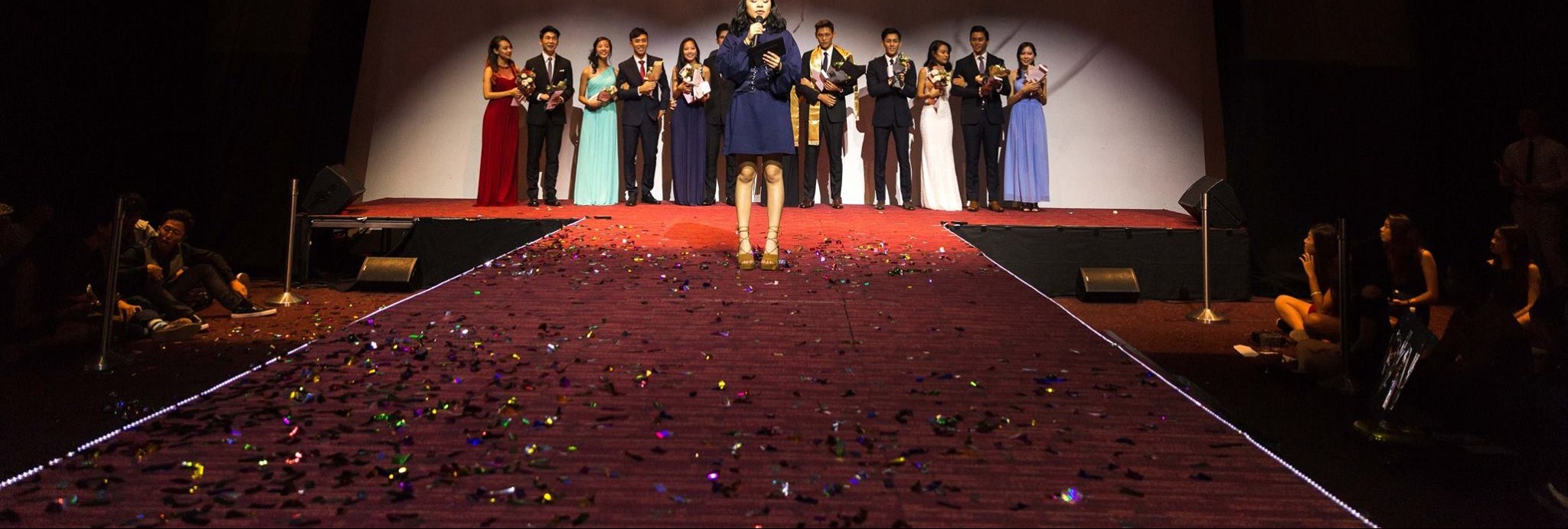No pageants in Tembusu – great!
Pageants are the rite of passage to university life. Organised by all faculties and halls, it is an annual tradition dating back to the 80s. Yet, even as pageants make their mark in the various communities within the university, one particular community seems to be absent from the fanfare – residential colleges, including Tembusu.
Well, watching the Medicine faculty’s beauty pageant unfold on social media (not forgetting the cringey but hilarious ‘sponsored posts’ plastered all over Instagram) and the Dinner & Dance event was a much more pleasant experience than I had imagined. With news spreading about questionable orientation events, what with all the disturbing sexualized games two years back, I had definitely not held high expectations. Nevertheless, contrary to my perhaps overly-presumptuous perception of what pageants were supposed to be, the relative innocence of the pageant was a big relief. There weren’t any snarky or sexist comments about the contestants’ appearances. In fact, instead of inappropriate bikini catwalks, the contestants put up amazing dance performances – just like those seen in famous musicals.
But never mind that; I still had an unsettling feeling about it. With almost everyone cat walking on stage looking like they just came out of a Vogue magazine cover, I pondered over the apparent beauty standard displayed. Was I supposed to vote for someone who I thought looked the best, given that I don’t know 90% of the people on stage? Was I supposed to base my understanding of them on that one minute self-introductory video? Was everyone seated down below the stage supposedly less attractive, and thus less beautiful than those who were on it? The superficiality of the entire event just stood out to me.
Now, let me qualify my statement. I’m not one for the common narrative of universal beauty, where apparently, each and every one of us look ‘beautiful’. I’m probably going to get a lot of flak for saying this, but there’s a reason why natural selection takes place. Ultimately, it is the fittest of them all who triumphs. Individuals (animal or not) who are the most attractive logically have the highest chance of finding a mate, thereby being able to pass on favourable genes to their offspring (Shoutout to all you Biology students – you might find this concept familiar). At the end of the day, there are some of us who have been blessed with better looks than others. It may be about time that all of us, including myself, stick it out and face up to that harsh truth.
However, one source of comfort remains. Beauty, like many other words, can be defined in many other ways, for instance, personality, intelligence, and character, just to name a few. What we may lag behind in the ‘physical’ department, we make up for in others. And this plays out in natural selection too. In fact, higher cognitive functioning has been shown to be derived from evolution. And it makes sense. Debatably, people of higher intelligence and stronger character are more likely to succeed in what they do. For what is beauty without all these other traits? A seemingly beautiful person might be able to charm others with his/her looks, but without valuable character traits such as resilience, courage, or even intellectual curiosity, he/she is not likely to be able to accomplish anything productive and contribute significantly to this world. It may thus only be right for these equally crucial traits to be considered in our quest to find the best ‘King & Queen’.
Despite the incorporation of interview segments, for example, physical beauty remains at the top of a pageant contest’s judging criteria. Frankly, a ten-second response to an interview question is hardly representative of a person’s personality or intelligence. Even scholarship or job interviews take a minimum of fifteen minutes to evaluate candidates.
Moreover, voting in these pageant contests opens up a whole can of worms. What results is inherently a popularity contest where the most well-liked (or well-known, in the case of freshmen pageants where students have perhaps only known each other for a few weeks) emerge victorious. This further exacerbates the superficiality of pageants.
After all, isn’t it daunting to start university life being judged based on your looks? A university is a place of higher learning – a place of arguably genuine intellectual engagement and exchange. Should one’s journey not begin on a perhaps more productive note?
So Tembusu’s lack of a pageant may be a good thing after all. And I’m thankful for that. Our emphasis on building an intellectually vibrant and open community just does not gel well with the idea of a pageant. We need to recognise the dangerous message pageants send – that beauty can only ever be encompassed in the single definition of ‘physical attractiveness’. Yet, I recognise the constraints pageant committees face. Given that pageants usually take place soon after orientation events, it is difficult for us freshmen to get to know our peers on a deep enough level to cast a mature vote for our favourite ‘King & Queen’. I guess all we can do is to take this peculiar tradition with a pinch of salt, understanding that ultimately, beauty is and should be all-encompassing.
Images used are from the NUS Science Bash Facebook Page.
–
Clarissa is a Year 1 medical student with a strong interest in politics and current affairs. When she’s not drowning in anatomy, she can be found dreaming of having a Starbucks Pumpkin Spice Latte while hiking in a chilly forest somewhere. She is obsessed with the British accent and hopes to attend Hogwarts one day.

